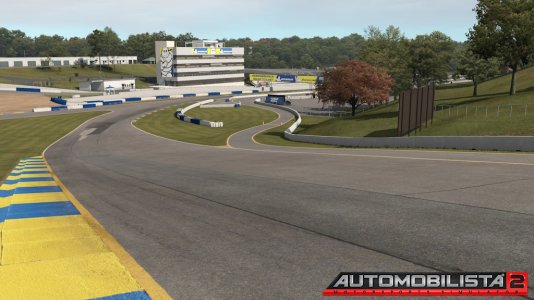Davide Nativo
Premium
How would it be, to face computer opponents that behave like human players?
Simulations have made enormous progress during the last two decades. If you pick whatever title from the mid-nineties, whether it is a flight, combat or racing simulator, and compare it with its contemporary contender from today’s selection, you will immediately notice a big step up in almost all areas.
Graphics are the most evident improvement, thanks to the newest engines, which are capable of rendering very detailed models, bigger textures and handle a larger number of objects on screen than they used to. This makes it possible to have rather complex scenes with more realistic scenarios. Of course, we all tend to say that physics are more important, and while this is very true, it is also true that having nice graphics surely is a big boost in immersion. We experience reality through our senses, and sight is one we very much rely on. What this means is that having better, eye-pleasing environments helps us believing that what we are trying actually is a believable representation of reality as we know it, making the title more enjoyable.
Physics is another area that has seen a great advancement. While sims from older generations are still kept in very high regard by the community, and sometimes not only still played but also actively developed or enhanced by modders, it is undeniable that the most realistic sims from the current generation are much more detailed, physics wise. Tyres' dynamics, engines' characteristics, ambient properties, these are all areas that have been enriched with a lot more variables than in the past, making your virtual vehicle much closer to its actual counterpart, and thus giving you a better representation of its real nature, again with obvious benefits for the player.
Audio is instead one area that while it has been improved, it has though not seen that much of a progress compared to graphics or physics. In the early noughties for example, sims used to include specific engines for audio rendering, and having a dedicated sound card would allow you to have a very different experience from those who did not. It is not an exaggeration or an overstatement. Playing through your audio chip integrated in the motherboard or through a dedicated Sound Blaster would result in feeling like playing two completely different titles; such was the difference in quality. Of course, you could say that integrated audio chips have become way better now, and that on the other side dedicated audio cards have stalled, with not that many being available for purchase, and new models being produced every 5 years or so. However, I cannot help but think that this is also because game developers themselves have stopped supporting those, at least in a sense of making full use of the advantages that a dedicated audio card can provide. It is a bit of a shame, since, as we were saying before, yes, sight is a very important sense for human beings, and the one we give more credit to in games and sims, but hearing is just as prominent for immersion, even though it is usually neglected. It helps having a better understanding of what your vehicle is doing, where it is placed in space in comparison to your opponents, and in what type of ambient you are moving in.
Nonetheless, the AI compartment really is where a stagnation has occurred in the last decades. In fact, Artificial Intelligence has not really evolved since the early sims, at least not in the fundamental ways it operates. It can handle more factors now, it can respond to a lot more parameters than before, but it is still hard bounded to an old philosophy of work. AI has to interact with the various iterations it has in the scene (your offline opponents) and, most importantly, you, the player. To do so, putting it in an oversimplified manner, it works through a series of coded lines, which tell it how to respond to certain situations that may, or may not, arise. Where is the limit in this kind of implementation? You cannot code a satisfying response to all of the possibilities that can occur while playing in a simulated environment, especially given the presence of human intelligence, which is unpredictable. Moreover, sims are getting more and more complex, which means even more parameters to respond to for the computer. You can see the limitations in current AI whenever you do something they are not coded to respond to, that they are unprepared to face. Then, glitches and weird behaviours happen.
The solution will be a new sort of AI, which is already at work in different areas of computer technology but just now breaking through in the mass market, and so in gaming and simulations. I talk about Neural AI.
When we talk about Neural AI, we often hear the term “Machine Learning”. What does it mean? Now, of course I do not pretend to be an expert in computer programming, since I am really not, and I won’t be arrogant enough to expect giving you a perfect, in depth-answer to that question. I think that there are better-suited accounts[1], written by actual professionals that can give you a more accurate understanding of the way Neural AI works. What I am here to tell you, and discuss with you, is the importance of this new approach, how it can revolutionize gaming by overthrowing the old AI with its limitations and bounds.
Neural AI is no longer chained to a series of fixed parameters, only to which it is able to respond. It is no longer coded to counter act to specific actions, but to general conditions. It means that developers are now doing a very different job than they were in the past. They do not tell the AI exactly what to do anymore. They tell it what they expect it should do in a determined situation. They are, basically, trainers, so to speak, and the AI is now like an athlete trying to reach its objectives successfully. Doing a very simple example, given a certain track, devs ask the AI to set a specific lap time by respecting certain tasks like staying between the white lines, handling traffic, managing the vehicle characteristics. The AI then starts training, and “learning”, by itself. It goes around and around until it understands how to reach the time required in a satisfying (relating to the general parameters set from the developers) manner. It can be trained to achieve whatever objective it is desired to get. Replying to the original question, we say that it is learning because it is indeed. The old AI in fact, as we said, could only respond to situations it already knew because they were coded in it. It had no memory. Neural AI can respond to any situation, because none is coded; only its expected behaviour is. Therefore, when confronted with a problem, it tries to overcome it successfully and if it does not, it ‘thinks’ of new ways to solve it. It applies a strategy. We can finally have an opponent that is actually able to withstand any possible scenario and the unpredictability of human behaviour, because it learns from past experiences, remembers what went wrong and what went well, just as we do, store it for the future and then tries to do and be better next time around, every time.
Isn’t this something we have been asking for, for a very long time? Computer opponents will be much more “human” than they have ever been, much for our enjoyment, and simulations will make another big step forward in realism. This truly is the future; this will really be the golden age of simracing.
Like what we do at RaceDepartment? Follow us on Social Media!
Notes:
[1] You can start by reading here: https://en.wikipedia.org/wiki/Machine_learning










